Curriculum Statement

Curriculum statement
At Bentilee Nursery School we recognise that every child is unique with their own experiences and early years journey. Some may stay with us for one term, some may stay for eight, starting their learning journeys in either the Autumn, Spring or Summer term. Some may begin their journey as a 2 year old, others as a 3 year old. Some may continue their journey at another Nursey provider, whilst others may leave us to begin their Reception year.
With reference to the statutory Early Years Foundation Stage (EYFS), our Curriculum is guided by Development Matters, which sets out the pathways of children’s development in broad ages and stages within the 7 areas of learning.
Building on the strengths of the children, it is unique to our setting and responsive to the needs of our children. Our curriculum follows our earliest starters as rising 2 year olds until they leave us for their next steps on their Early Years journey. Our children do not ‘finish’ the curriculum, but through positive and empowering statements, our Curriculum Aims shows the aspirations and attitudes that we want our children to experience and learn through the embedding of knowledge, skills, attitudes and cultural capital in order to prepare them for their individual next step, building upon their strengths and the strengths they bring from their family, home and community regardless of when they may begin their learning journey with us (Intent).
We recognise that all children can achieve and make progress from their unique and individual starting points. We also acknowledge the different ways children learn and the challenges some children face and incorporate a balance of child initiated and planned activities. For our older children, opportunities for ‘in the moment’ planning support the half termly introduction of carefully planned topics, through which clear concepts, knowledge and skills are taught and developed through the seven areas of learning. For our younger children the topics are flexible based around children’s unique interests and what is happening in the wider community, with planning child led, staff continually assess the knowledge and skills learnt. (Implementation).
At Bentilee Nursery, progression of skills is a continual process based upon the broad ages and stages of development of Development Matters. We acknowledge however, that children’s development is not neat and orderly and that as each child winds their individual path through the different areas, they will do countless things that do not appear in ‘development grids’ but are equally valuable for their learning, nor will they necessarily show signs of development descriptors, nor develop these skill in the same order that they may be presented in developmental documents (Birth to 5 Matters).
With this in mind, progression is measured by termly tracking in which practitioners use not only the progression of skills document, but also their own professional knowledge, supported by completion of half termly ICAN statements based upon each half terms learning intentions and a child’s individual achievements (Impact).
From this, staff then make informed decisions about steps for development as the next topic is introduced, allowing for areas of learning and development points to be reviewed or revisited to ensure knowledge and skills are embedded.
Bentilee Nursery School Curriculum

Bentilee Nursery school-
Intent, Implementation and Impact
agreed way of working, the aims of our setting in helping children develop and learn
- We offer a balance of child initiated and adult-led learning using continuous play and small group activities.
- It is play with a purpose.
- It is fun
- The curriculum provides a wide range of rich experiences based on the needs of our community, e.g regular visits in the local community to understand the world around them
- We plan in visits and visitors in school throughout the year to bring experiences beyond the community to children e.g The Animal Man
- It is based on the unique child’s interests, especially in the 2 year old room. In the 3 / 4 yr old room it is loosely based on planned topics throughout the year with the enhanced provision supporting the unique child’s interests and consolidation of pre taught skills.
- The child’s voice in all learning is very important
- The children’s characteristics of learning are looked at daily and used to support a certain child’s preferred way of learning.
- It allows children to take risks, make mistakes and keep trying, in a safe and supportive environment.
- Positive praise is key
- Communication and language is always a priority in everything we teach
- It is challenging but achievable
- Our classroom environment will foster curiosity
- There is a CAN DO approach to all activities
- We aim to ensure resources we use are high quality and are valued in the way we store them and look after them, at child height and with pictures to support tidying up.
- We value the parent as the first educator in partnership to support children’s learning
- Equality, Diversity and Disability are always celebrated as unique child attributes
- We are constantly reflective practitioners
- We are enthusiastic to embrace change and new professional development opportunities
- We aim to help children to become school ready
- We will use a teacher support assistant to support with more assisted health care and communication development
- To work with other agencies to give children the best possible start
- To support parents to be the best they can e.g coffee mornings, Parent Councils, in house family learning, Early Helps
- We aim to be an accessible school for everyone
- Family economic issues will not be a barrier to high quality learning
Implementation
what we do every day to help children make progress.
- There is a daily routine
- There is always circle time
- There are golden rules to support behaviour for learning
- We chase up attendance every day
- There is always continuous provision to consolidate learning. This is put out using the unique child’s interests e.g. dinosaurs
- We take photos of the children to capture their learning and give the time to look back and reflect on what they remember
- We collect wow work- in the 3/4s, this is trying to capture independence. Children are encouraged to stick in their own work in their Special book.
- We always play with the children, modelling and extending language, supporting children to say a string of words and supporting children to repeat back. Staff clearly use their mouths –showing tongue, teeth and lips to model pronunciation.
- We revisit past learning daily and build on this to move learning forward.
- We focus on individual needs. Play with a purpose is differentiated and small groups of children are focused upon with the same needs or with more-able to support and model learning
- The nursery includes all school groups in all experiences
- We promote processes to learning new skills. These are more important than an end product
- Staff plan as a team children’s needs and achievement in mind
- We encourage children to independently practice skills e.g accessing resources independently
- We embrace different cultures, languages and festivals and celebration all year round e.g with dance, food tasting
- We take time to listen and give children time to think and process thoughts
- Child’s voice is valued encouraged and supported in all play and learning activities
- We go on professional development courses to support our own areas of weakness
- We use Tools:- Launchpad for Literacy to support teaching the gaps in language development
- We use Development Matters consistently form our 2yr old room to the end of our 3 .4 yr old room to support child development
- We use the Stoke speaks out screening tool to track language development
- We use Time to Talk, Talk Boost, More Time to Talk. Running through this is Time to Listen.
- We promote equalities and accessibility through our on-going accessibility plan
- We do oral health tooth brushing daily, to support oral health
- We use Numicon from the age of 2 to support number development
- We welcome parent to stay and play with us in the 3 / 4 yr old room termly, to support learning and give ideas of home.
- We give out weekly “homework” that is celebrated in school
- We give out weekly library or reading books with reading diaries for parental comments
- We read and model stories with children daily to promote a love of books, story-telling and the written word
- We support story-telling, child’s voice and confidence to predict what comes next through the Helicopter stories approach in the Spring and Summer terms in the 3 / 4 yr old room
- We liaise with a variety of agencies with more expertise knowledge to support children’s learning and development e.g Health visitors, SEND, speech and language service, paediatricians and approved training companies
- The Family Support worker / Deputy safeguarding lead meets and greats daily, building up relationships with families
- We use Pupil premium monies wisely to develop individual learning
Impact
Impact -how we know what we are doing is making a difference.
- See our curriculum goals for 2 yrs old children by the time they leave that room.
- See our curriculum goals for 3 / 4 yr old children by the time they leave the nursery school to go the Reception class
- Recording child voice- voice as in actual voice or body language
- Parents’ views and observations
- Photographs that tell a story of a child’s development
- Independent “work” is recorded in their Special Book
- Staff professional reflections as a team- with examples
- Dojo- home / school interaction with photos and words about children’s achievements
- Our I CAN sheets show the child’s achievement journey in all areas of the curriculum
- Attendance is at least 85%.
- Language screening end of school results
- Child development tracking graphs show at least 80% are on track for their age in the Prime areas of learning. In the Specific areas of learning we are aiming for 80% are on track for their age.
- Children bring library/ reading books back to school weekly and are able to model how to hold and book and at least read pictures by the end of nursery at 4yrs old
- Children display curiosity and are asking questions by the time they leave at 4yrs old
- Children are school ready with their behaviours to learn- can sit and listen for 15mins to complete and activity at 4 yrs old.
- Children with SEN have robust learning programmes or staff know their strategies to support learning well to ensure children continue their learning journey in their next phase of learning.
- Behaviour for learning is clearly embedded through how they exhibit themselves in play learning situations.
- Attendance at family learning opportunities in school, as well as coming in for productions increases over the year. The family exhibit a joined up approach to learning, and supporting their child into the next phase education.
- All children will have made at least good progress by the time they leave nursery– there will be NO barriers to learning e.g SEN, disability, culture, gender, economic circumstances, family circumstances
3&4 Year Old - Curriculum Aims
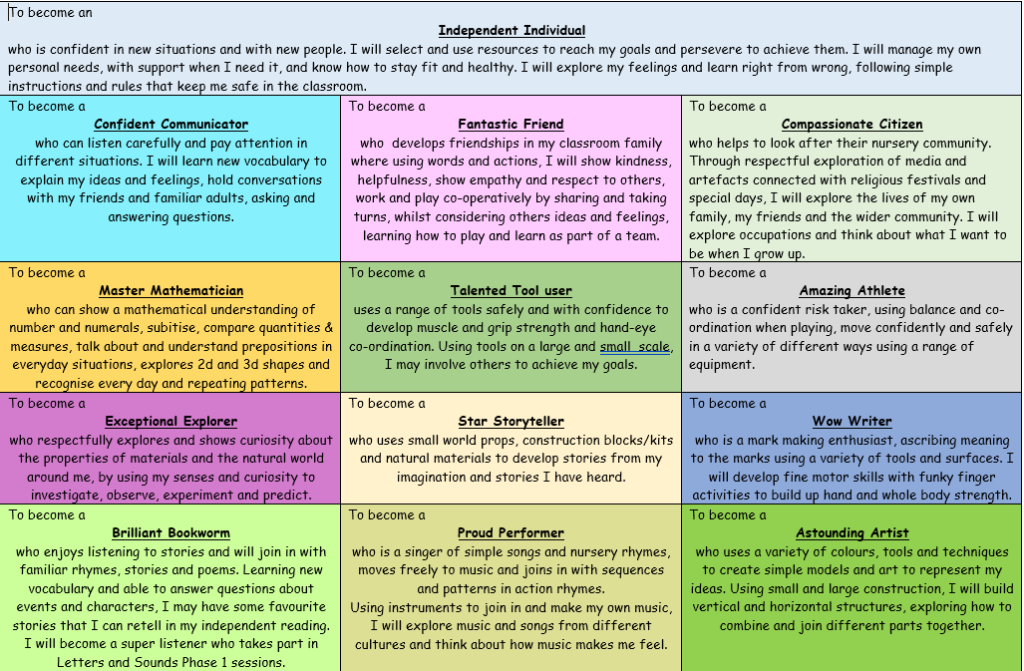
Aims and Progression of Skills
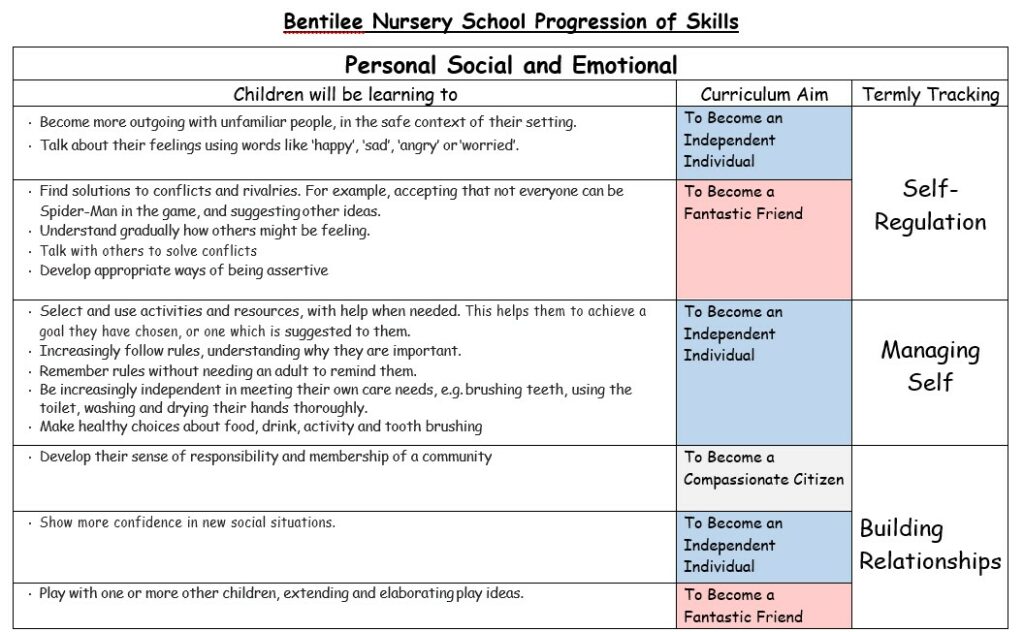
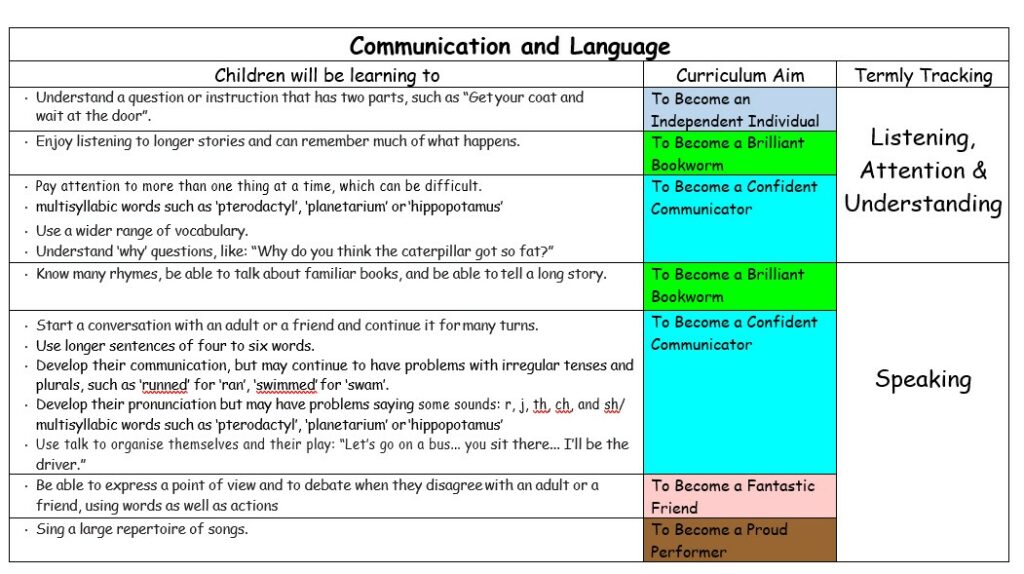
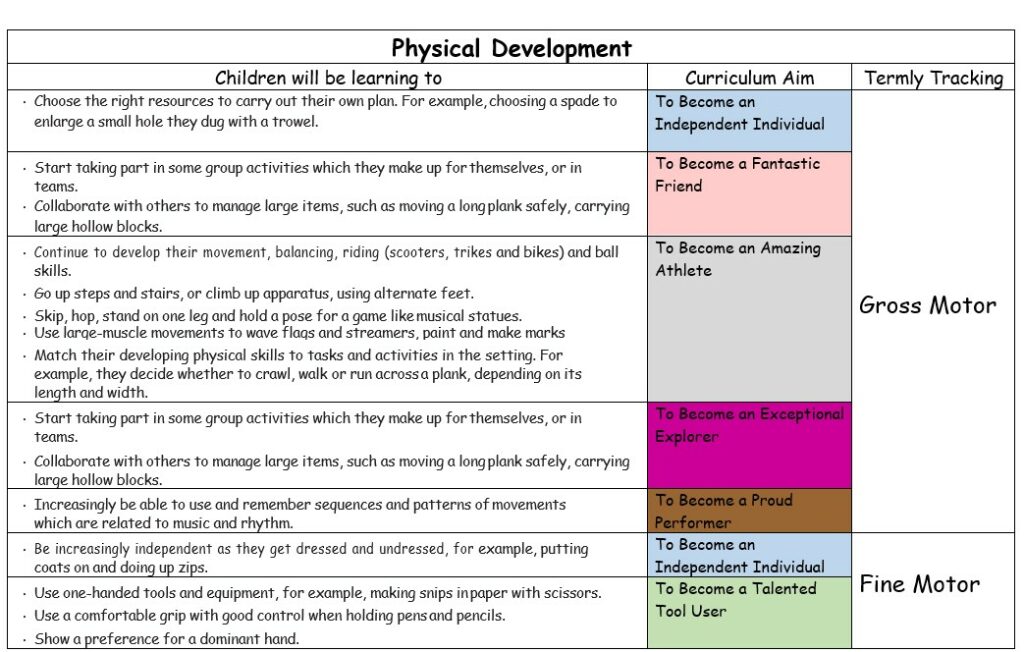
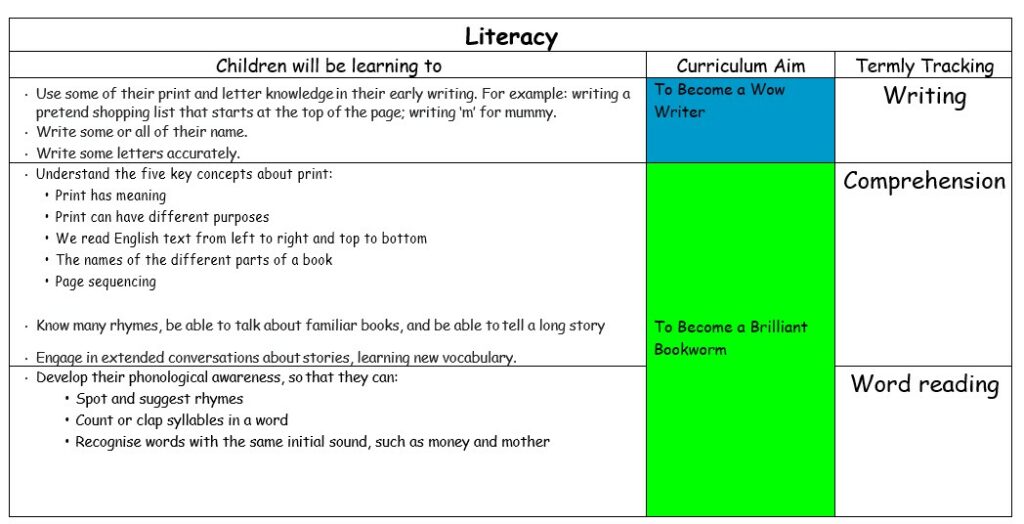

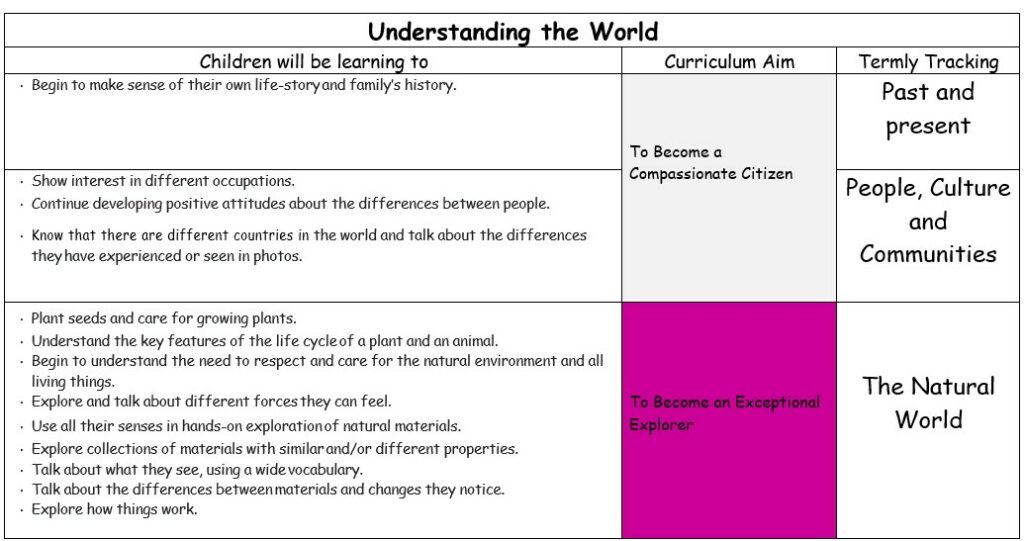
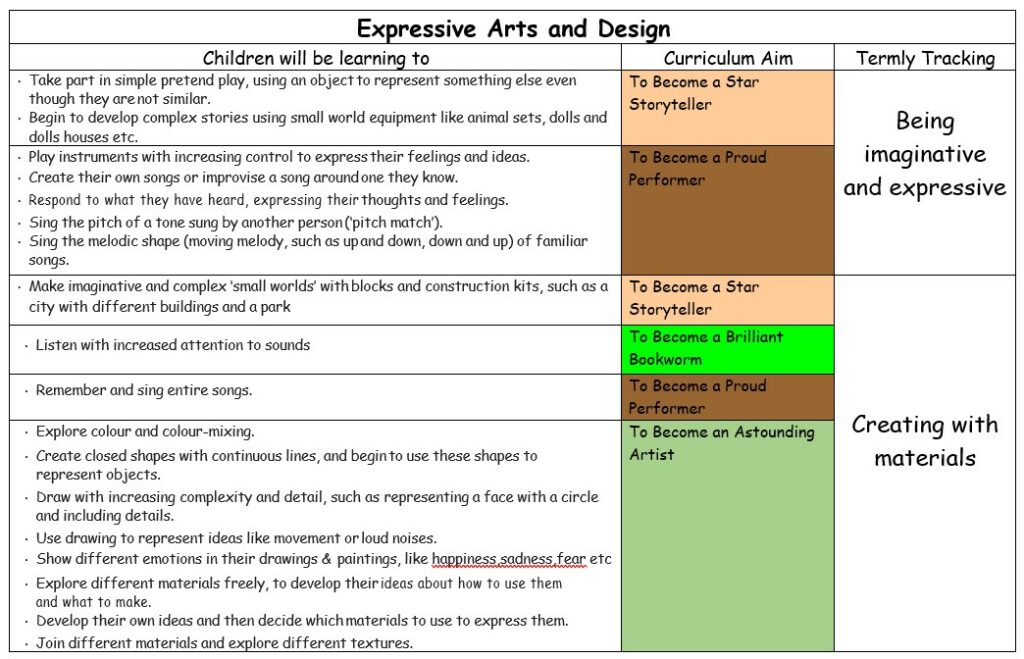
3&4 Year Olds - Long Term Yearly Curriculum Framework
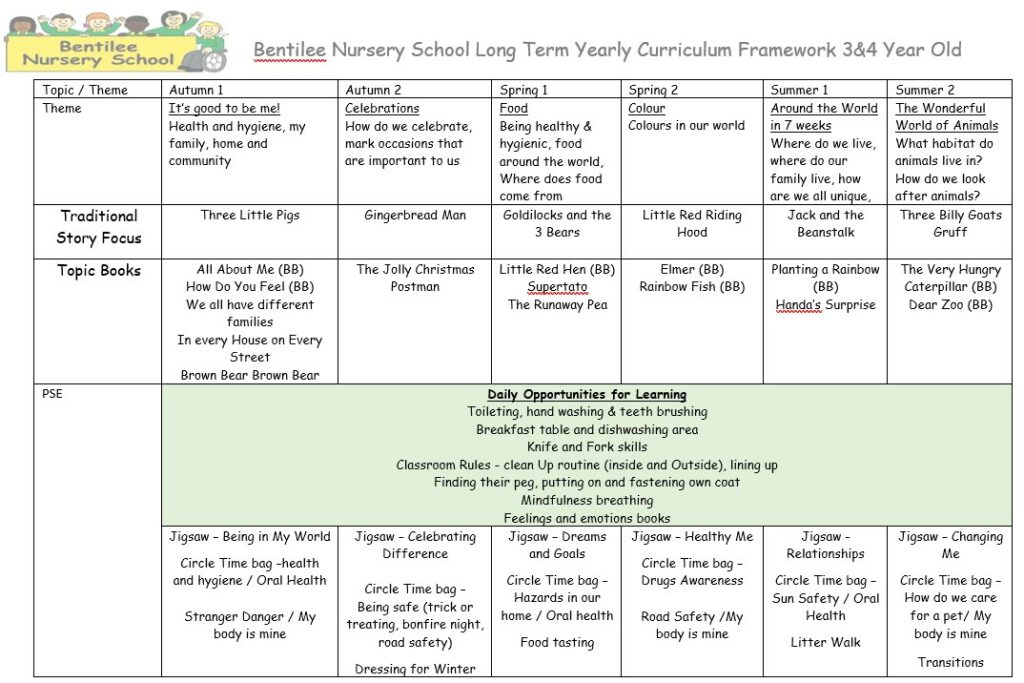

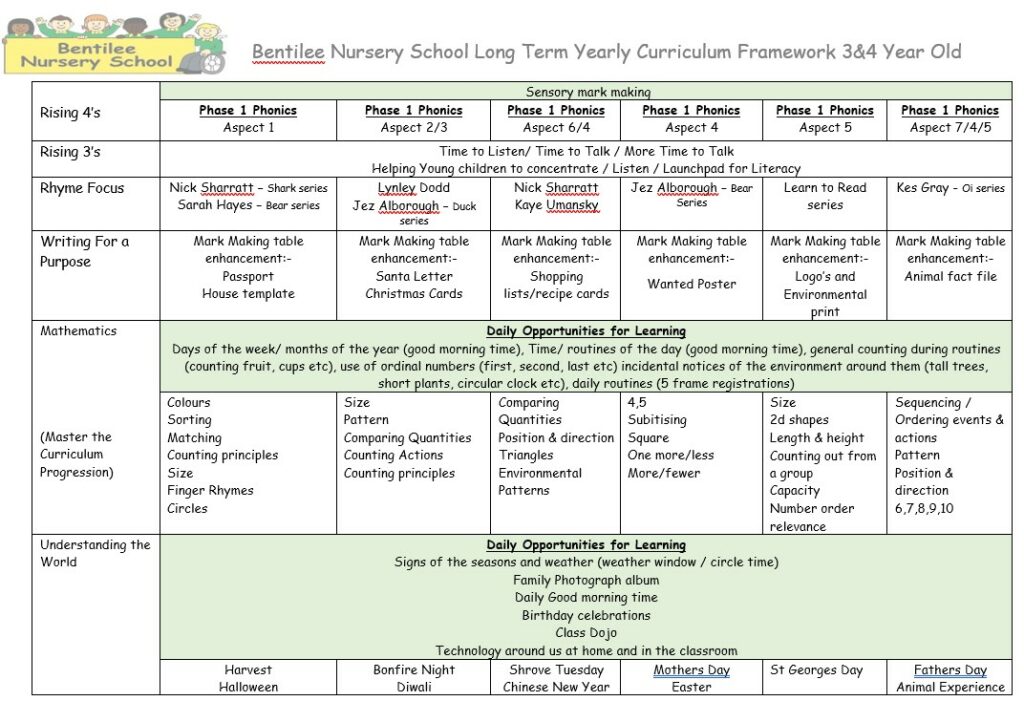
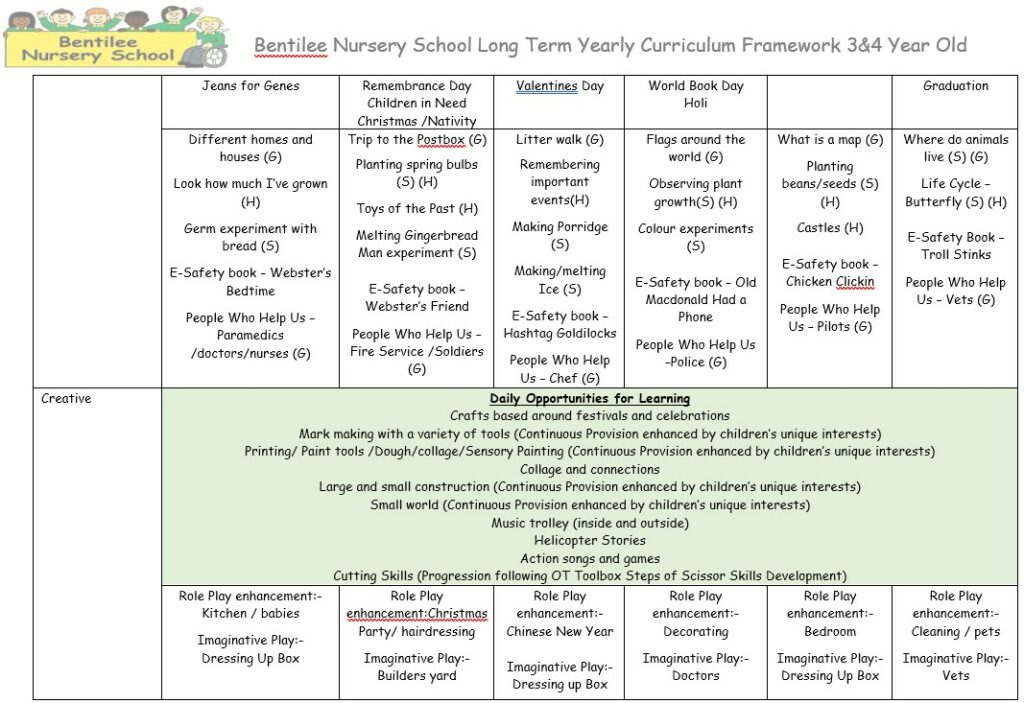
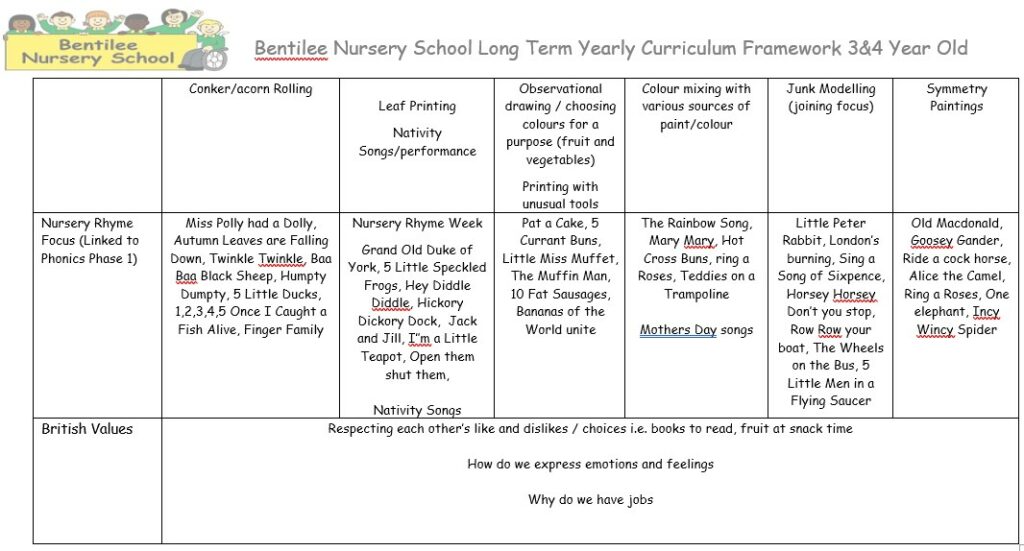
Maths Overview
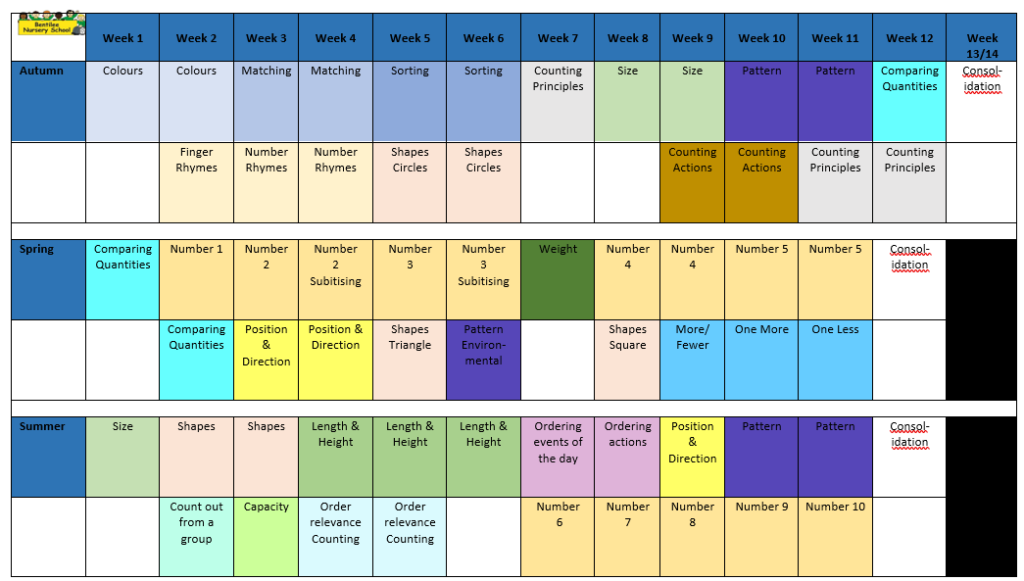
Phonics Overview
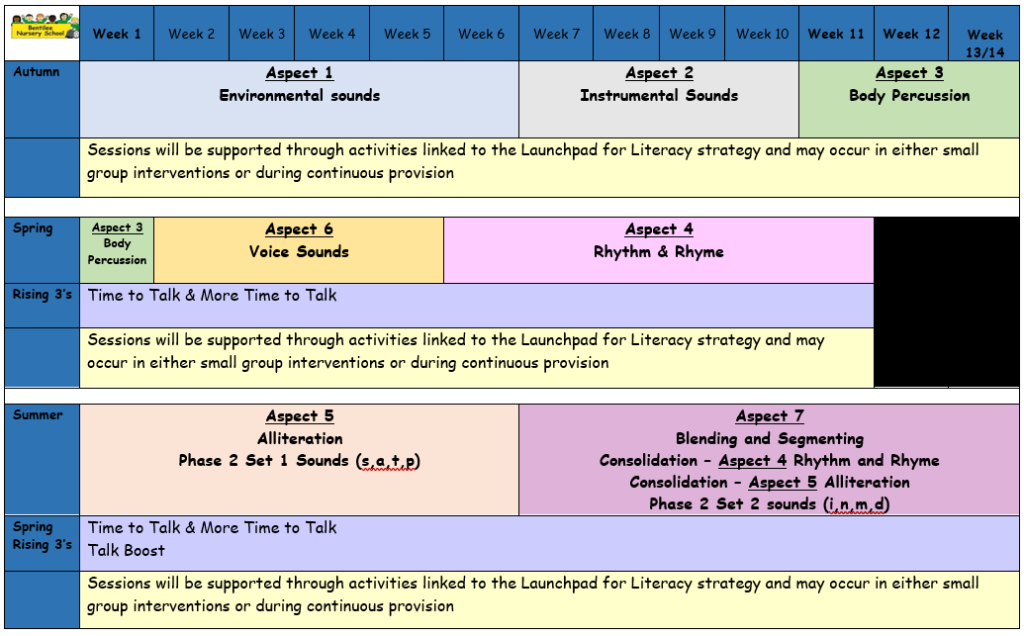
2Year Old's Curriculum Aims
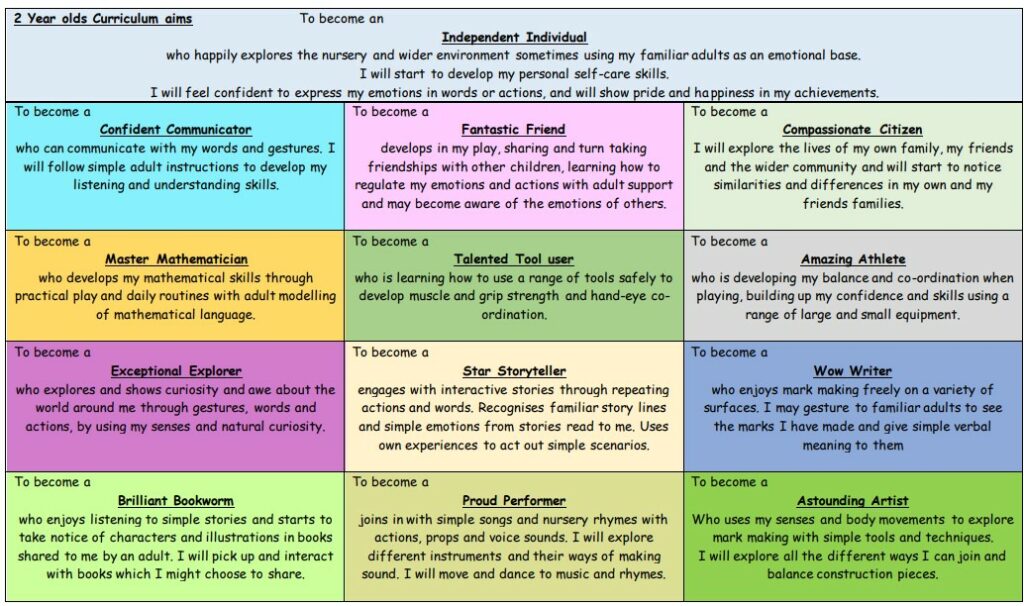
Bentilee Nursery School Curriculum Aims Progression of Skills 2’s
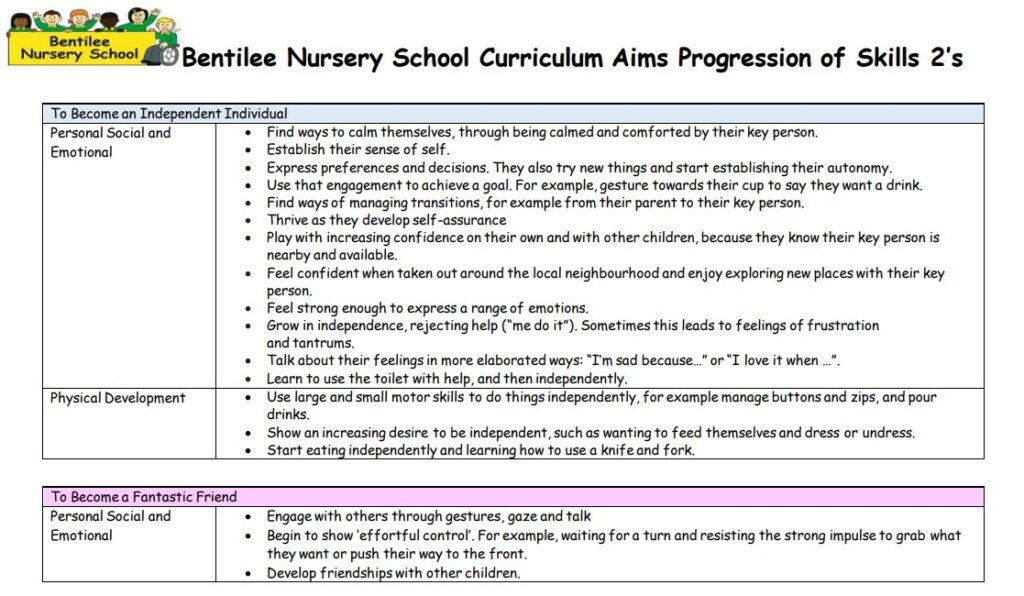
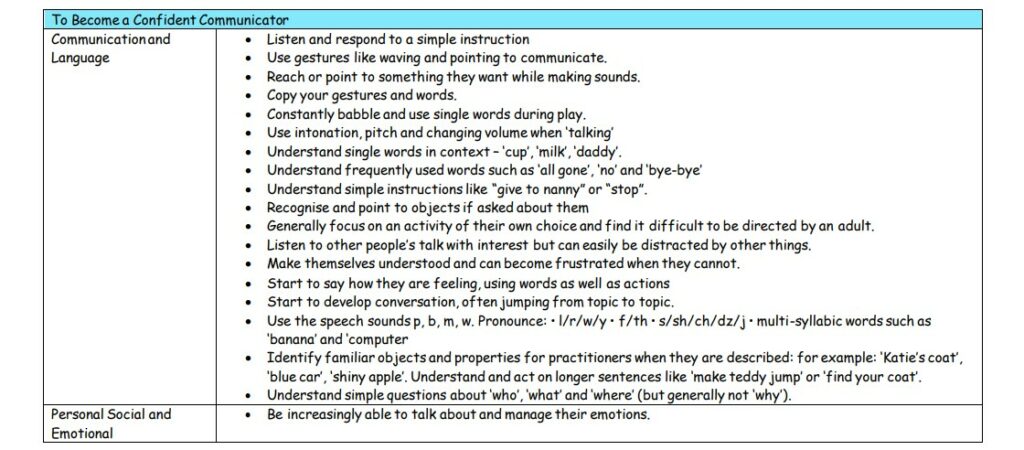
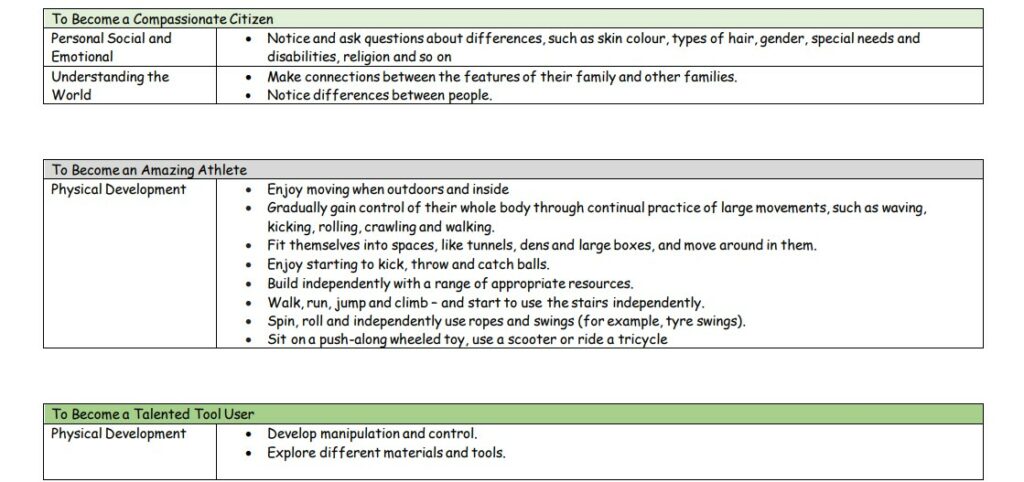
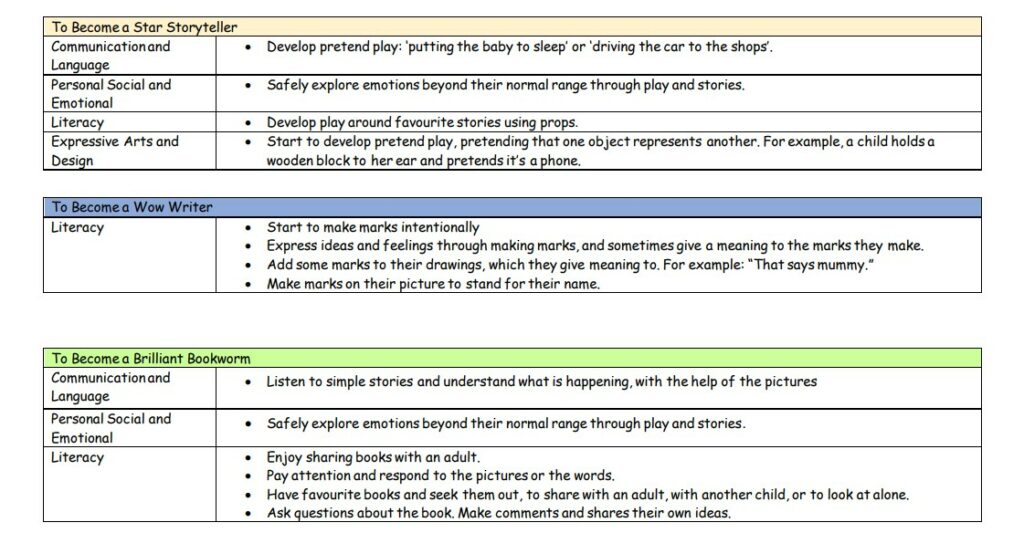
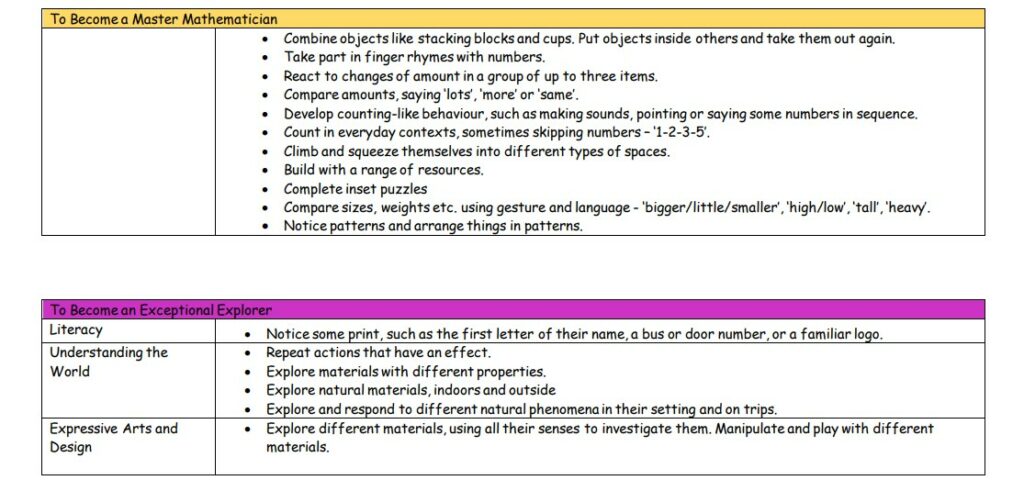
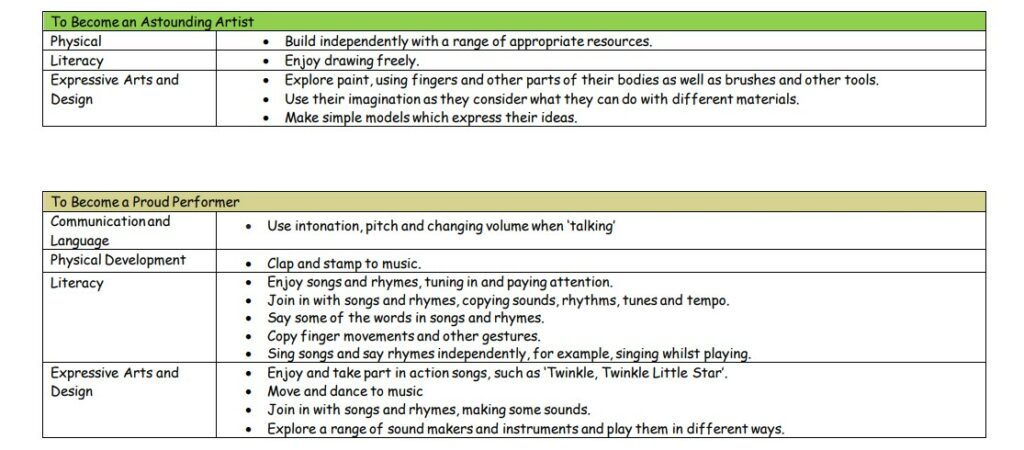
Bentilee Nursery School Remote Learning Policy





